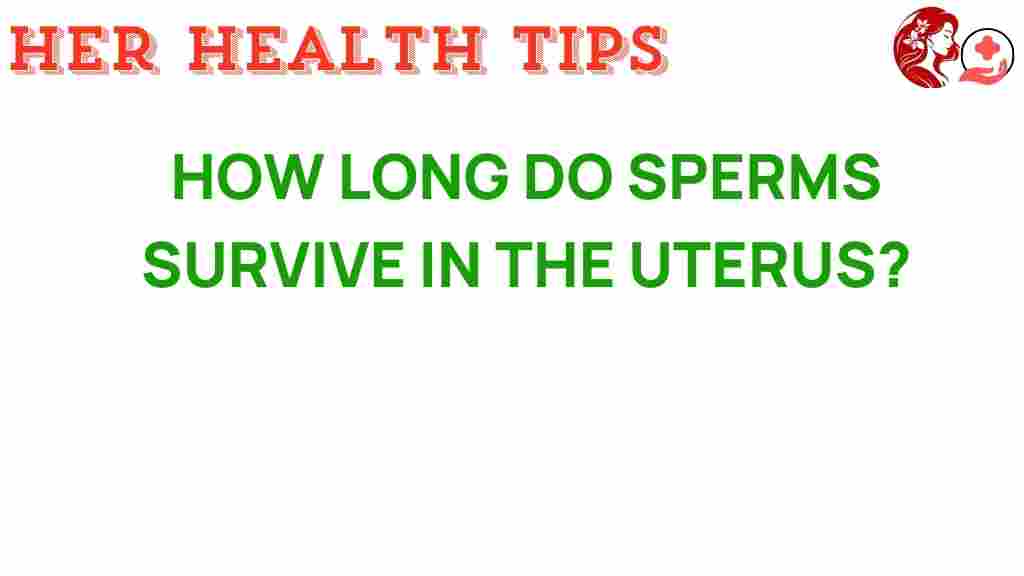The Surprising Lifespan of Sperm: How Long Do They Last in the Uterus?
Understanding the journey of sperm and its lifespan within the female reproductive system is crucial for individuals looking to conceive. The sperm lifespan can significantly impact fertility and the chances of successful conception. In this article, we will explore the factors that affect sperm viability, how long sperm can survive in the uterus, and what this means for reproductive health and conception.
What Is Sperm Viability?
Sperm viability refers to the ability of sperm to live and maintain motility within the female reproductive system. It is an essential factor when considering fertility, as viable sperm are necessary for successful fertilization of an egg. Various factors influence sperm lifespan, including:
- Health of the sperm: Healthy sperm are more likely to survive longer.
- Environment: The conditions within the uterus, including pH and hormonal balance, affect sperm survival.
- Timing of ovulation: Sperm must be present in the reproductive tract during the ovulation window to achieve conception.
Sperm Lifespan in the Uterus
One of the most surprising aspects of sperm is its lifespan within the uterus. After ejaculation, sperm enter the female reproductive system and can survive for varying lengths of time. Research indicates that:
- Sperm can live up to 5 days in the female reproductive tract.
- The average lifespan is typically around 3 to 5 days under optimal conditions.
- Factors such as the quality of sperm and the health of the female reproductive system can extend or shorten this lifespan.
This means that intercourse occurring days before ovulation can still lead to successful fertilization, making timing crucial in the conception journey.
The Sperm Journey Through the Female Reproductive System
Once sperm enters the uterus, they embark on a journey to meet the egg. Here’s a step-by-step breakdown of this journey:
- Entry into the Uterus: After ejaculation, sperm travel through the cervix and into the uterus.
- Navigating the Fallopian Tubes: Sperm must swim through the uterus and into the fallopian tubes, where fertilization typically occurs.
- Meeting the Egg: If an egg is present (during ovulation), sperm can fertilize it. If no egg is present, sperm will gradually die off.
- Fertilization: Successful fertilization occurs when a sperm penetrates the egg, leading to conception.
Factors Affecting Sperm Lifespan
Several factors influence how long sperm can survive in the uterus:
- Female Hormones: The hormonal environment during ovulation can enhance sperm survival.
- Cervical Mucus: The consistency of cervical mucus changes during ovulation, aiding in sperm viability and movement.
- Overall Health: Both partners’ health status can impact sperm quality and lifespan.
Reproductive Health and Sperm Lifespan
For optimal sperm lifespan and reproductive health, consider the following:
- Maintain a Healthy Lifestyle: Regular exercise, a balanced diet, and avoiding harmful substances can improve sperm health.
- Regular Check-ups: Routine medical check-ups can help identify any potential reproductive health issues early on.
- Stress Management: High-stress levels can negatively impact fertility, so engaging in stress-reducing activities is beneficial.
Understanding Ovulation and Fertility
Understanding ovulation is essential for maximizing chances of conception. The ovulation cycle typically lasts about 28 days, with ovulation occurring around the midpoint. Here’s how to track it:
- Calendar Method: Keep track of your menstrual cycle to predict ovulation days.
- Ovulation Predictor Kits: These kits measure hormonal changes to determine ovulation accurately.
- Physical Symptoms: Some women experience physical signs like changes in cervical mucus or slight cramping during ovulation.
By understanding your ovulation cycle, you can better time intercourse to align with the most fertile days, enhancing the chances of conception.
Troubleshooting Tips for Improving Fertility
If you are facing challenges with conception, consider the following troubleshooting tips:
- Consult a Specialist: If you have been trying to conceive for over a year without success, consider consulting a fertility specialist.
- Track Your Cycle: Keep a detailed log of your menstrual cycles and any symptoms to assist healthcare providers in evaluating your fertility.
- Consider Lifestyle Changes: Limiting alcohol, quitting smoking, and maintaining a healthy weight can positively impact fertility.
Conclusion
The lifespan of sperm and its ability to survive in the uterus is a crucial aspect of reproductive health and fertility. Understanding sperm viability and the factors that influence it can help individuals better navigate their fertility journey. By timing intercourse around ovulation, maintaining a healthy lifestyle, and being aware of reproductive health, couples can improve their chances of conception.
For more information on reproductive health and fertility, check out this resource. Additionally, if you’re interested in tracking your ovulation cycle, consider using this ovulation calculator to assist you.
This article is in the category Reproductive and created by HerHealthTips Team
